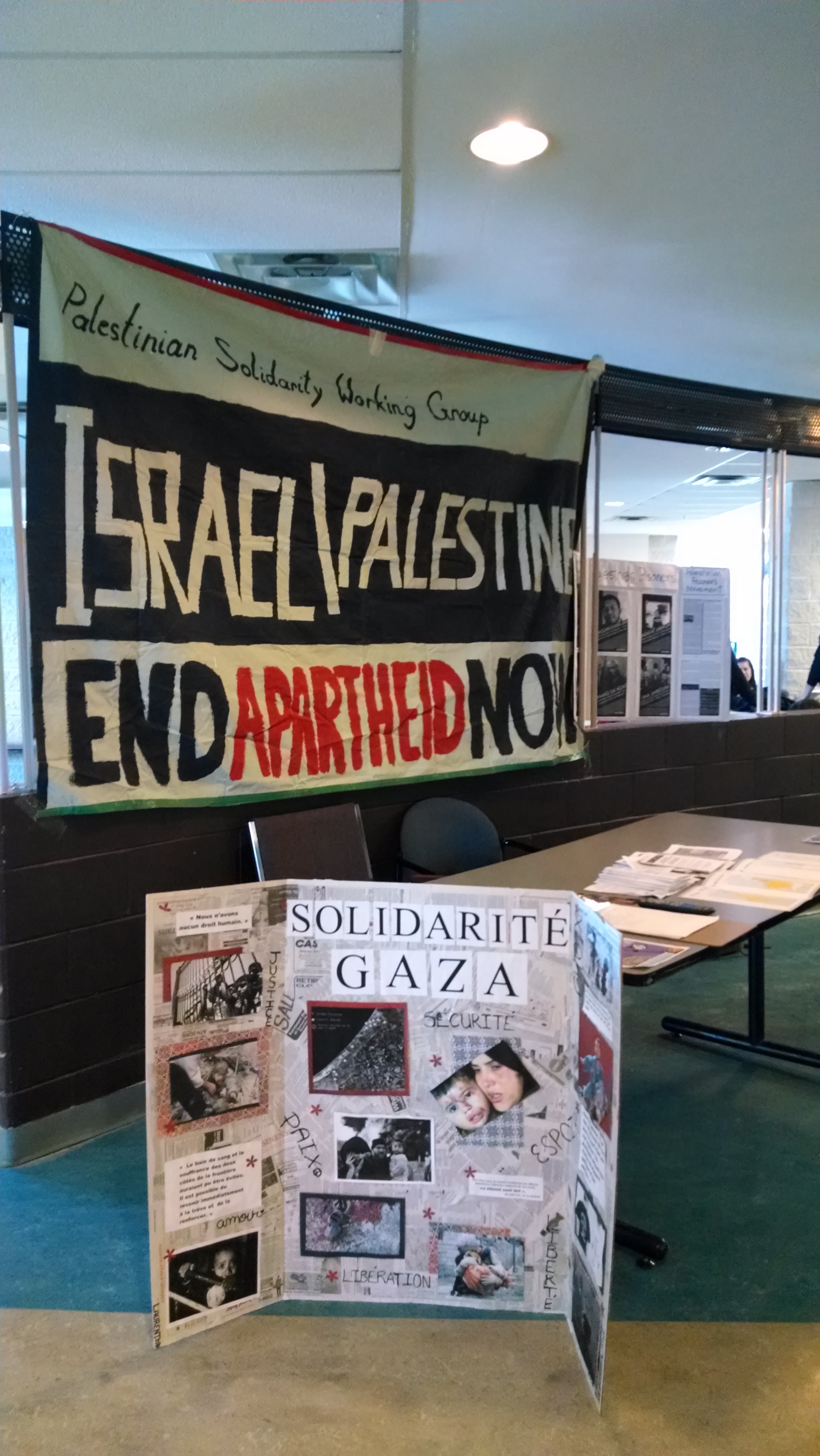By Gabriel Rodrigues
From March 3 to 6, a booth was held at the Laurentian Student Centre regarding the Israeli Apartheid week, and according to one of its organizers, raising awareness will hopefully stay in the “consciousness of students.”
“This is a solidarity campaign,” said Dana Cudney, a sessional faculty member in the department of Sociology at Laurentian. “Our hope is for students to learn of the distinct similarities between South African Apartheid and the current system and apartheid policies being deployed on Palestinian citizens.”
The Israeli Apartheid Week (IAW), in its tenth year, is an international series of events held in cities and campuses across the globe to educate people about Israel being an apartheid system over Palestinians. Also, the IAW wants to build a boycott, divestment, and sanctions campaign as part of the growing movement regarding this issue.
Laurentian University has been running the IAW for five years now, but has only established an informative table for four years with the help of the Palestine Solidarity Working Group of Sudbury.
For Cudney, who has taken a central role in organizing this booth for last two years, said the importance of setting up a table with relevant literature and faculty members to answer questions was “invaluable” for a students’ and others’ understanding of the issue.
“We have found that there is an overwhelming lack of understanding about root causes of the conflict,” she said. “This in itself makes it difficult for those who have a desire to understand the occupation to even formulate a starting point for inquiry. Often we start with dispelling the pervasive myth that this conflict is ageless by pointing out that its main architects were Britain and the U.S in the 1940’s.”
According to the Middle East Research and Information Project (www.merip.org), the conflict between Palestinian Arabs and Zionist (now Israel) Jews dates back to the end of the nineteenth century. Although both groups have different religions, as Palestinians include Christians, Muslims and Druze, religious differences were not the cause of the conflict, but a fight over land.
Jewish claims over the land was based on a biblical promise to Abraham and his descendants, on the fact that the land was the historic site of the ancient Jewish Kingdoms of Israel and Judea, and Jews’ need for a haven following European anti-Semitism.
Palestinian Arab claims to the land are based on the fact they have been residing in the country for hundreds of years and represented the demographic majority.
From the end of World War I until 1948, the area that both groups claimed was known internationally as Palestine. However, following the 1948-1949 war, this land was divided into three parts: the State of Israel, encompassing 77 per cent of the land, the West Bank and the Gaza Strip.
There was only about 150,000 Palestinians remaining in the State of Israel. Although they were granted Israeli citizenship and the right to vote, Palestinians remained second-class citizens because they were non-Jews, which restricted their chances to work, to freedom of speech and even confiscation of their property.
In 1967, there was a six day war that established Israel as the dominant regional military power where they captured and has since, occupied the West Bank and the Gaza Strip.
Since 1967, over 12,000 houses have been demolished by the Israeli military, leaving 70,000 Palestinians homeless. Also, according to the Israeli human rights organization, B’Tselem, 1496 Palestinians have been killed by the Israeli military since 2004. On average, two Palestinians have been killed every single day for the last six years.
Cudney said throughout the week there was a film series regarding the Israeli Apartheid Week to further educate students and others regarding the conflict between Israelis and Palestinians.
Such films included: Occupation 101, Peace, Propaganda and the Promised Land, Jaffa: The Orange’s Clockwork and Five Broken Cameras.
“This was a good starting point,” said Cudney. “The films featured this year were varied in their purposes. They concisely presented the background information and historical formation, and also presented economic perspectives and narratives of the current situation in Israel and Palestine.”
Cudney said she hopes raising awareness to students of these social justice issues will increase “exposure of political activities” regarding the Israeli Apartheid movement.
“In a sense, Canada provided the original apartheid blueprint,” she said. “South African delegates studied Canadian first nations reserve systems previous to creating apartheid policies in their own nation. Plus, it is largely agreed that South African apartheid systems crumbled under economic pressure from divestment campaigns.”
All in all, Cudney said the organizing group at Laurentian as well as the Palestine Solidarity Working Group of Sudbury “had a successful week.”
“Many more individuals from the campus community have shown interest in becoming more involved,” she said. “Additionally, we have received support via email from various students (some Palestinian) thanking us for helping raise awareness for themselves and their families. This alone validates all of our efforts.”
For more information about the Israeli Apartheid movement, please contact dcudney@laurentian.ca or rroth@laurentian.ca.
